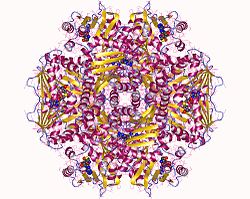Methyltransferases
| Methyltransferases | ||
|---|---|---|

|
||
| Enzyme classification | ||
| EC, category | 2.1.1. , Transferase | |
| Response type | Methylation | |
| Occurrence | ||
| Parent taxon | Creature | |
Methyltransferases or methylases are enzymes in all living things that methylate their substrates , that is, they transfer a methyl group to other biomolecules . This reaction is part of very different metabolic pathways , especially in the biosynthesis of cobalamins , menaquinones , porphyrin , methionine and dTTP . In addition to various synthetic pathways, methyltransferases generally help with the processing of genetic information, such as the processing of ribosomal RNA, in DNA methylation and other methods of regulation of transcription , in mRNA capping and the modification of tRNA . There are N-methyltransferases , O-methyltransferases and the comparatively rarer C-methyltransferases .
Examples
- mRNA cap methyltransferase
- N6 adenosine methyl transferase
- Thiopurine methyltransferase
- SETD3 , essential for the replication of enteroviruses
Behavior towards mercury
In the organism, methyltransferases can transfer methyl groups to mercury cations, creating highly toxic methylmercury , which is partly responsible for the fact that mercury can develop its toxic effects in the body.
Individual evidence
- ↑ Search result UniProt EC: 2.1.1. * By keyword
- ↑ Search result UniProt EC: 2.1.1. * By taxonomy
- ↑ Xiaodong Cheng: S-Adenosylmethionine-Dependent Methyltransferases. World Scientific, 1999, ISBN 978-9-814-49497-7 . P. 6.
- ↑ SD Siciliano, DR Lean: Methyltransferase: an enzyme assay for microbial methylmercury formation in acidic soils and sediments. In: Environmental toxicology and chemistry / SETAC. Volume 21, Number 6, June 2002, pp. 1184-1190, PMID 12069301 .